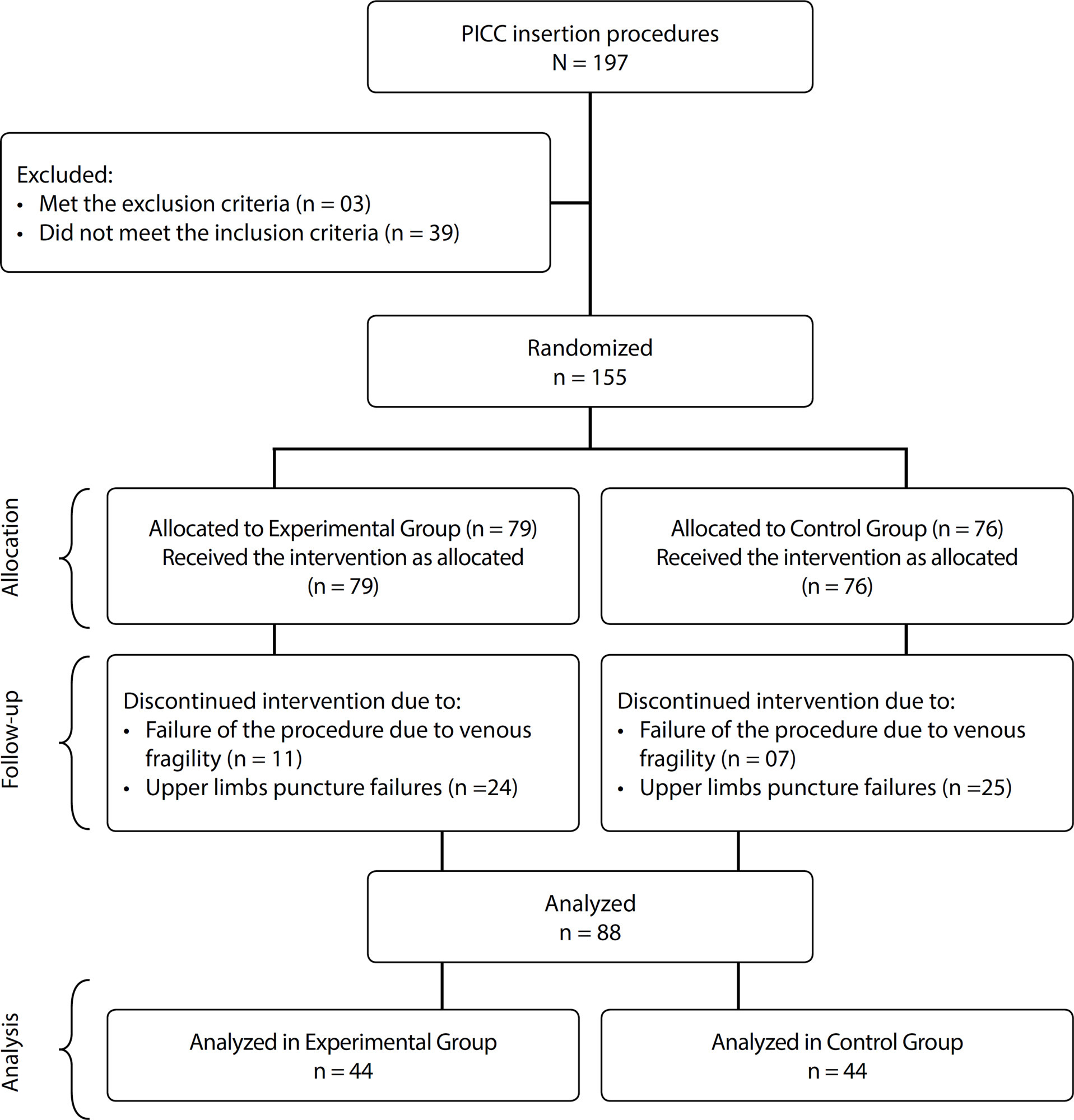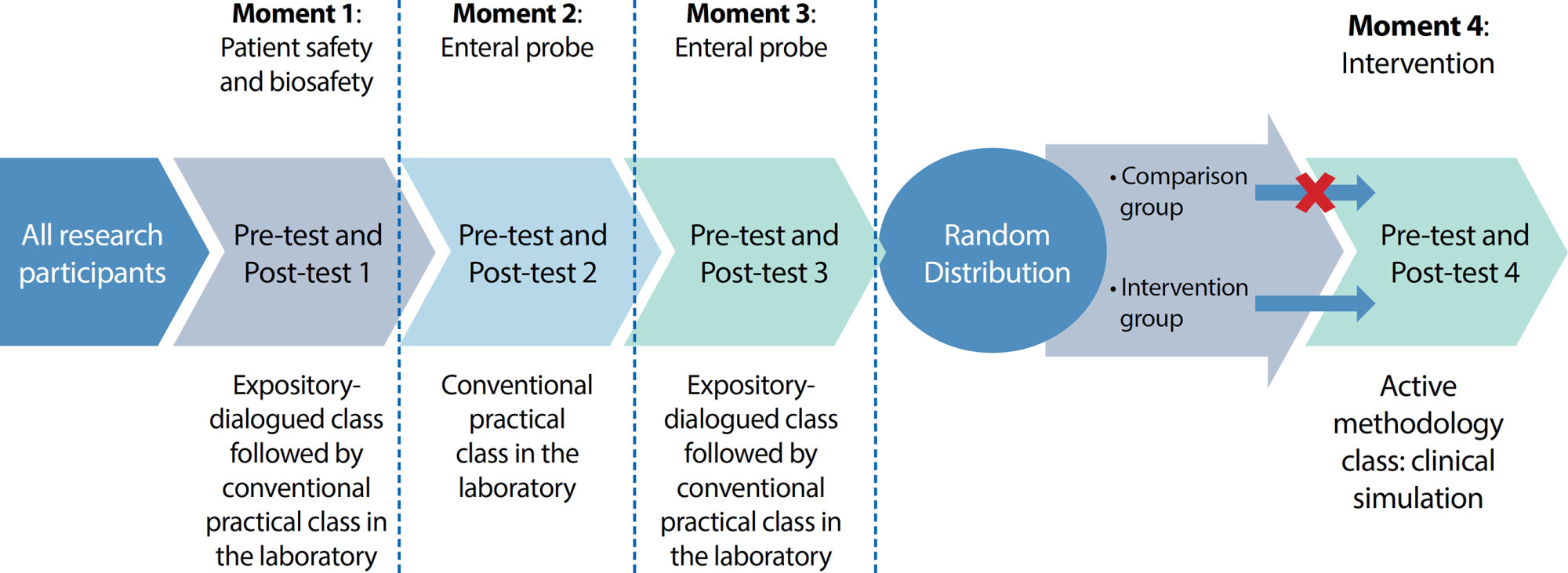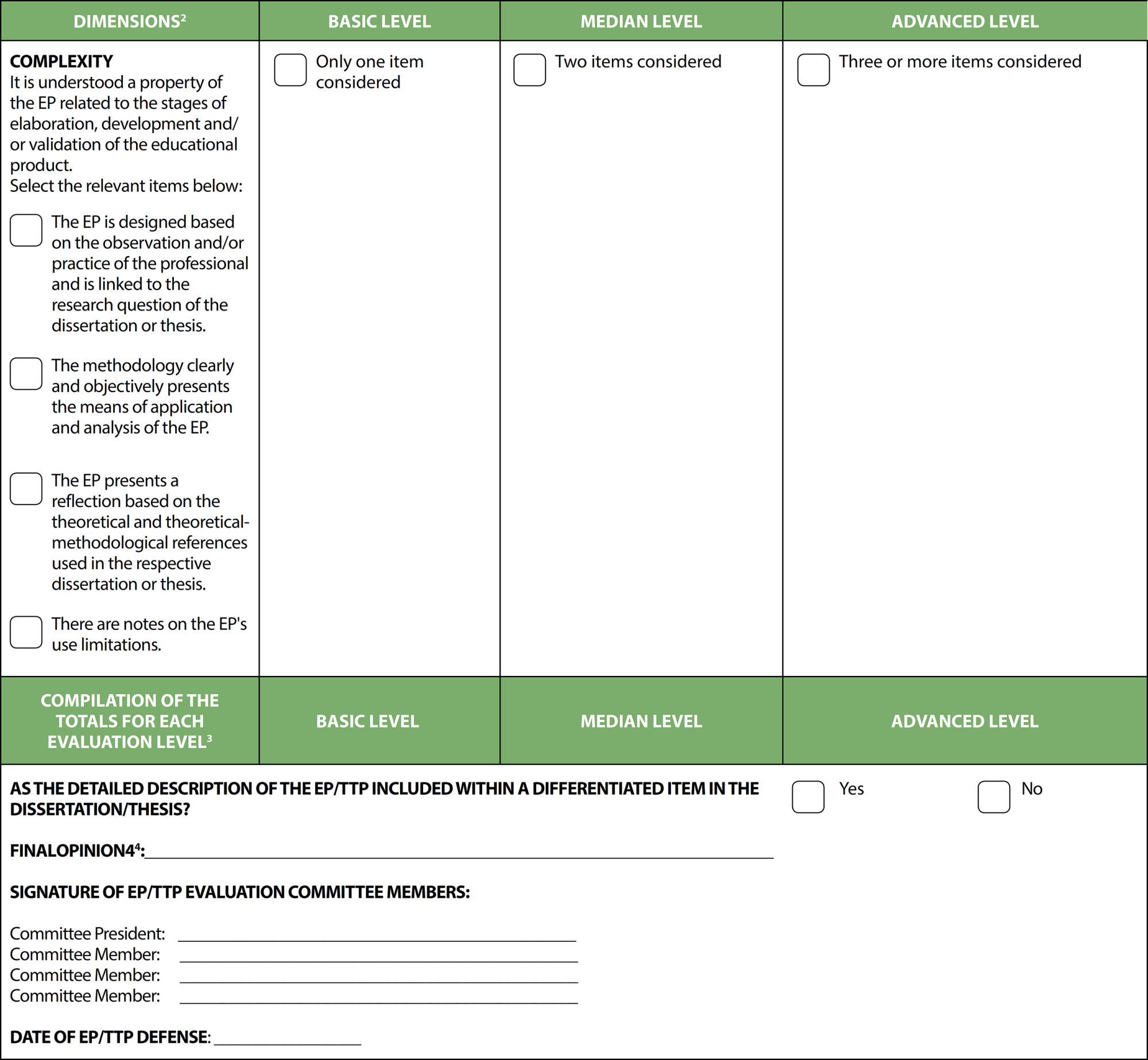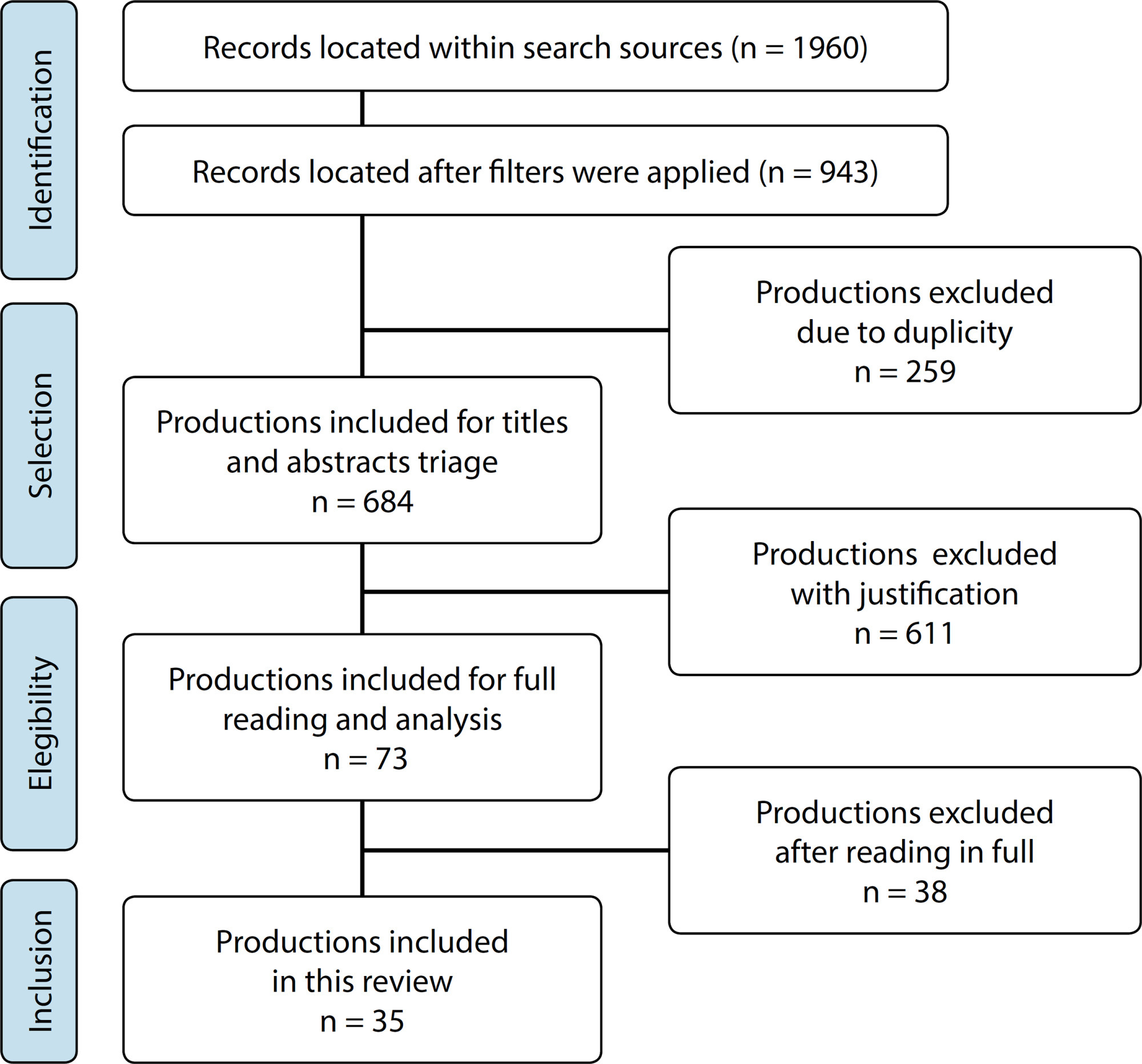-
ORIGINAL ARTICLE10-18-2022
Humanized childbirth: the values of health professionals in daily obstetric care
Revista Brasileira de Enfermagem. 2022;75(2):e20210052
Abstract
ORIGINAL ARTICLEHumanized childbirth: the values of health professionals in daily obstetric care
Revista Brasileira de Enfermagem. 2022;75(2):e20210052
DOI 10.1590/0034-7167-2021-0052
Views0See moreABSTRACT
Objective:
To understand health professionals’ values in the process of thinking and feeling about obstetric care, based on their experienced needs in the care process.
Methods:
Phenomenological study based on the Schelerian framework, with 48 health professionals from four maternity hospitals within the Metropolitan Region II of the state of Rio de Janeiro. Data collection was done through a phenomenological interview; and the analysis, with the Ricoeurian methodological framework.
Results:
The vital value was signified in care centered on physiological processes, for an individualized and safe monitoring. The ethical value was signified in the attitudes that provide women with autonomy in their way of giving birth, and recognize dialogue as a process of sympathy, affection, and bonding.
Conclusion:
The resignification of obstetric practice, articulated with public policies in the field of delivery and birth, supported by a vital ethical value, positively contributes to the humanization of care for women.
-
ORIGINAL ARTICLE10-18-2022
Methods for measuring venous peripherally inserted central catheters in newborns
Revista Brasileira de Enfermagem. 2022;75(2):e20210045
Abstract
ORIGINAL ARTICLEMethods for measuring venous peripherally inserted central catheters in newborns
Revista Brasileira de Enfermagem. 2022;75(2):e20210045
DOI 10.1590/0034-7167-2021-0045
Views0See moreABSTRACT
Objective:
to analyze the results of insertion procedures of Peripherally Inserted Central Catheters in newborns using two measurement methods.
Methods:
this is a randomized clinical trial, presenting descriptive and exploratory results of variables. It was held at a Neonatal Intensive Care Unit. Data were collected between September 2018 and 2019. The sample analyzed was 88 catheter insertion procedures, distributed in two groups. Study approved by an Institutional Review Board and obtained registration in the country and abroad. Descriptive analysis and logistic regression of data.
Results:
modified measurement obtained a significant difference for the central catheter tip location. Elective removals and adverse events were not significant between groups; however, poor positioning was related to adverse events.
Conclusions:
between the two methods analyzed, the modified measurement obtained better results in the proper catheter tip positioning and, consequently, less risk to patients.

-
ORIGINAL ARTICLE10-18-2022
Clinical simulation as a Nursing Fundamentals teaching method: a quasi-experimental study
Revista Brasileira de Enfermagem. 2022;75(2):e20201155
Abstract
ORIGINAL ARTICLEClinical simulation as a Nursing Fundamentals teaching method: a quasi-experimental study
Revista Brasileira de Enfermagem. 2022;75(2):e20201155
DOI 10.1590/0034-7167-2020-1155
Views0See moreABSTRACT
Objectives:
to evaluate students’ knowledge gain after the implementation of clinical simulation in Nursing Fundamentals disciplines.
Methods:
a quasi-experimental intervention was carried out with 60 students, distributed in comparison and intervention groups, who underwent traditional teaching and traditional teaching associated with simulated teaching, respectively. Pre-test and post-test instruments were applied to both groups.
Results:
after analyzing the students’ performance through the applied instruments, both groups had a cognitive evolution along with the taught content, however, when compared, the intervention group obtained a higher knowledge gain than the comparison group (p = 0.016), demonstrating progressive and increasing improvement with the use of the methodology.
Conclusions:
simulated teaching significantly helps students in gaining technical-cognitive knowledge. Therefore, it is recommended to adhere to the use of this methodology for teaching Nursing Fundamentals.

-
REFLECTION10-18-2022
The act of playing as a signifier for the application of the dramatic Therapeutic Toy performed by the nurse: theoretical reflection
Revista Brasileira de Enfermagem. 2022;75(2):e20210062
Abstract
REFLECTIONThe act of playing as a signifier for the application of the dramatic Therapeutic Toy performed by the nurse: theoretical reflection
Revista Brasileira de Enfermagem. 2022;75(2):e20210062
DOI 10.1590/0034-7167-2021-0062
Views0See moreABSTRACT
Objective:
To reflect on the possible contributions of the act of playing as a signifier in the use of dramatic Therapeutic Toy performed by the nurse.
Methods:
Theoretical-reflexive study, based on three moments: The language of the unconscious that emerges as a signifier when playing; How the dramatic Therapeutic Toy is used by the nurse; and the act of playing as a signifier during the application of the dramatic Therapeutic Toy: contributions to nursing practice.
Results:
Through the intervention of the nurse in the sessions, the act of playing mediated by the dramatic Therapeutic Toy provides the child with the opportunity to elaborate on signifier elements that had not been meant by him.
Final considerations:
Through the dramatic Therapeutic Toy, the articulation of the child’s organism with his reality in the formation of the self constitutes an advance for the production of knowledge and nursing assistance to the child, enabling complete care and allowing the elaboration of their anxieties, which collaborates so that the child constitutes himself as a subject.
-
ORIGINAL ARTICLE10-18-2022
Information and communication technologies: interfaces the nursing work process
Revista Brasileira de Enfermagem. 2022;75(2):e20201280
Abstract
ORIGINAL ARTICLEInformation and communication technologies: interfaces the nursing work process
Revista Brasileira de Enfermagem. 2022;75(2):e20201280
DOI 10.1590/0034-7167-2020-1280
Views0See moreABSTRACT
Objectives:
to unveil the meanings that nurses attribute Information and Communication Technologies for the nursing work process
Methods:
qualitative research, theoretically and methodologically based on the Complexity Theory and on the Grounded Theory, respectively. Research with 19 participants, being 12 clinical nurses, and 7 resident nurses. Semi-structured interviews were used for data collection.
Results:
the results revealed the meanings that clinical nurses attribute to Information and Communication Technologies and, thus, the motivations and limitations for the use of these technologies, pointing out possibilities and strategies that impact the nursing work process, based on the interactions promoted by the official and non-official use of these resources.
Final Considerations:
the meanings that nurses attribute to Information and Communication Technologies are dependent on their ability to successfully employ those technologies and their importance to the work process developed by the professionals.
-
REFLECTION10-18-2022
Improvement of Educational Products Validation form in professional postgraduate programs
Revista Brasileira de Enfermagem. 2022;75(2):e20210063
Abstract
REFLECTIONImprovement of Educational Products Validation form in professional postgraduate programs
Revista Brasileira de Enfermagem. 2022;75(2):e20210063
DOI 10.1590/0034-7167-2021-0063
Views0See moreABSTRACT
Educational Product and Technical-Technological Product constitute a specificity of postgraduate programs in the professional modality, a product that must be carefully evaluated by the programs and recorded on platforms of evaluating bodies. In 2019, a working group from the teaching area was assembled to create a Validation Form for these products. Thus, this article aims to present a proposal for improving this Validation Form for Educational/Technical-Technological Products, based on reflections treated in scientific articles and scientific events from the area, focusing on the relevance and need for this type of evaluation in a standardized way. It is intended to collaborate with the improvement of the evaluation processes and procedures of Educational/Technical-Technological Products for the necessary accuracy, representativeness, and homogeneity, which will allow the real dimensioning of the contributions of these products. This involves not only training qualified professionals, but also transforming practices in the Sistema Único de Saúde (SUS) [Brazil’s Unified Health System], promoting advances in science and in its fields of application.

-
10-18-2022
COVID-19 and the nursing labor market: lessons learned by analogies between historical events
Revista Brasileira de Enfermagem. 2022;75(2):e20200328
Abstract
COVID-19 and the nursing labor market: lessons learned by analogies between historical events
Revista Brasileira de Enfermagem. 2022;75(2):e20200328
DOI 10.1590/0034-7167-2020-0328
Views0INTRODUCTIONThe nursing labor market in Brazil is experiencing a paradox. There is, at the same time, both a strong pent-up demand for nursing workers and a large supply of unemployed nursing workers, in addition to workers who have left their profession to work in another field(). Major financial crises, such as the one that the […]See more -
10-18-2022
Clinical progression of COVID-19 coinfection in people living with the human immunodeficiency virus: scoping review
Revista Brasileira de Enfermagem. 2022;75(2):e20201380
Abstract
Clinical progression of COVID-19 coinfection in people living with the human immunodeficiency virus: scoping review
Revista Brasileira de Enfermagem. 2022;75(2):e20201380
DOI 10.1590/0034-7167-2020-1380
Views0See moreABSTRACT
Objectives:
to map the production of scientific knowledge on the clinical progression of COVID-19 coinfection in people living with the human immunodeficiency virus (HIV).
Methods:
scoping review, with search strategies in MEDLINE, Scopus, Embase, Web of Science, and LILACS. Dual independent data extraction and analysis of the material with similarity compilation and narrative synthesis.
Results:
sample consisted of 35 articles. Fever, cough, and dyspnea were the most prevalent signs/symptoms. Recurrent complications involved desaturation/worsening of oxygen desaturation and pneumonia. No standard pharmacological treatment was identified, and the main interventions involved the provision of supplemental oxygen and mechanical ventilation. The studies recommended preventive, care, and pharmacological practices.
Conclusions:
the clinical manifestations, complications, and treatments/assistance care for people coinfected with SARS CoV-2/HIV are similar to those of the general population. Coinfection, overall, does not infer a worse prognosis.

-
REVIEW09-18-2020
Allocation of resources for health care in COVID-19 pandemic times: integrative review
Revista Brasileira de Enfermagem. 2020;73:e20200244
Abstract
REVIEWAllocation of resources for health care in COVID-19 pandemic times: integrative review
Revista Brasileira de Enfermagem. 2020;73:e20200244
DOI 10.1590/0034-7167-2020-0244
Views0See moreABSTRACT
Objective:
To analyze information on resource allocation in the context of the COVID-19 pandemic, published in indexed scientific journals, from December 2019 to March 2020.
Methods:
This is an integrative literature review, which took place in March 2020. All databases were investigated and studies were found only in MEDLINE. After applying the established criteria, six articles were selected.
Results:
It was evident that the allocation of resources is carried out as the demands emerge. The fragility in presenting scientific-methodological evidence that can guide decision makers for assertive allocation of available resources is highlighted. The results showed that studies on this subject are incipient and need to be expanded.
Final considerations:
The need for health organizations and area authorities to be better prepared for the proper use of available resources, with allocation based on scientific evidence and maximization of resources is indicated.

-
ORIGINAL ARTICLE05-24-2021
Critical thinking in nursing training: evaluation in the area of competence Education in Health
Revista Brasileira de Enfermagem. 2021;74:e20200979
Abstract
ORIGINAL ARTICLECritical thinking in nursing training: evaluation in the area of competence Education in Health
Revista Brasileira de Enfermagem. 2021;74:e20200979
DOI 10.1590/0034-7167-2020-0979
Views0See moreABSTRACT
Objective:
To analyze the constitution of critical thinking in nursing training in the approach by competence and the integrated curriculum, considering the evaluation process by capturing its challenges, and proposing overcoming strategies.
Methods:
Qualitative. In the first phase of data collection, interviews were conducted with twenty-four professors, nine preceptors, and fifteen students to reconstruct the profile of competence, and in the second phase, a workshop to validate the profile identified challenges and proposals. The Collective Subject Discourse was used to analyze the interviews and the holistic competence reference in reconstructing the profile.
Results:
The critical thinking is built based on experiences in the world of work, and evaluation is the conductor of reflections towards emancipation.
Final considerations:
It signals the importance of professor training in the learning evaluation and working with the collective construction of subjects to overcome challenges that happen in the changes of training.
-
REFLECTION10-26-2020
Covid-19 pandemic and the motivations for demanding health service in indigenous villages
Revista Brasileira de Enfermagem. 2020;73:e20200312
Abstract
REFLECTIONCovid-19 pandemic and the motivations for demanding health service in indigenous villages
Revista Brasileira de Enfermagem. 2020;73:e20200312
DOI 10.1590/0034-7167-2020-0312
Views0See moreABSTRACT
Objective:
To discuss the fundamental aspects in the establishment of preventive measures to tackle covid-19 among indigenous people in view of the motivations for seeking health care in villages of the Terra Indígena Buriti, Mato Grosso do Sul, Brazil.
Methods:
Theoretical-reflective study based on assumptions of the National Health System and previous ethnographic research that enabled the identification of the motivations to seek health care in Buriti villages.
Results:
Indigenous people seek health centers for health care programs assistance, treatment of cases they cannot resolve and to chat. Such motivations were the basis for discussing the indigenization process in the confrontation of the new coronavirus pandemic in indigenous lands.
Final considerations:
The motivations for seeking health care show the physical and social vulnerability of the Terena ethnicity. The effectiveness of the social isolation measure in the villages depends on the dialogue with indigenous leaders, professional engagement and intersectoral actions.
-
ORIGINAL ARTICLE07-10-2020
Formation of protagonist adolescents to prevent bullying in school contexts
Revista Brasileira de Enfermagem. 2020;73:e20190418
Abstract
ORIGINAL ARTICLEFormation of protagonist adolescents to prevent bullying in school contexts
Revista Brasileira de Enfermagem. 2020;73:e20190418
DOI 10.1590/0034-7167-2019-0418
Views0See moreABSTRACT
Objective:
to develop a participative strategy of health education in the formative process of protagonist adolescents aimed at preventing school bullying.
Method:
qualitative interventive-participatory research, based on the Community-Based Participatory Research and in the Culture Circles of Paulo Freire. The sample was intentional, with the participation of 12 adolescents who were considered leaders. For data production at the moment of educational intervention, observation techniques were employed with note-taking in a field diary, plus photographic and video records.
Results:
the pedagogical intervention model raised the opportunity for the adolescents’ active participation, aiming at the development of skills that create pro-social behaviors, empathetic and assertive relations, which are able to face bullying and transform the school environment.
Final considerations:
the use of participative methodologies, in the youth protagonism perspective, has the potential to support educational practices of school nurses in collaboration and leadership of antibullying programs.

-
03-26-2021
Professional competency for elder care: perception among professors, nursing students, and nurses
Revista Brasileira de Enfermagem. 2021;74:e20200446
Abstract
Professional competency for elder care: perception among professors, nursing students, and nurses
Revista Brasileira de Enfermagem. 2021;74:e20200446
DOI 10.1590/0034-7167-2020-0446
Views0See moreABSTRACT
Objective:
to know the perception of nurses, undergraduate students, and professors about the competencies for professional nurses in elder care.
Methods:
this is a qualitative analytical study developed with six professors, four nurses, and 12 nursing students. Data were collected through semi-structured interviews and analyzed using Fiorin’s Discourse technique, with support from the MAXQDA software.
Results:
the competencies identified included knowledge of theories and general concepts of gerontology, communication, listening, leadership, teamwork, proactivity, respect, and empathy.
Final considerations:
knowing the competencies contributes to understanding the aging process and qualifying nurses for elder care.
-
ORIGINAL ARTICLE08-30-2021
Family functionality and burden of family caregivers of users with mental disorders
Revista Brasileira de Enfermagem. 2021;74(5):e20201061
Abstract
ORIGINAL ARTICLEFamily functionality and burden of family caregivers of users with mental disorders
Revista Brasileira de Enfermagem. 2021;74(5):e20201061
DOI 10.1590/0034-7167-2020-1061
Views0See moreABSTRACT
Objective:
to verify the difference of mean or median in the scores of family functionality and burden of family caregivers of people with mental disorders.
Methods:
cross-sectional study carried out in a Psychosocial Care Center with 61 family caregivers. Instruments were used for sociodemographic characterization, care process, Family Apgar Index and Family Burden Interview Schedule. Mean/median difference tests were adopted.
Results:
women with mental disorders and the presence of children in the home decreased the median of the family Apgar score. Difficulty in the relationship between caregiver/user, nervousness/tension, physical aggression and agitation of patients increased the global average of subjective burden.
Conclusions:
nursing interventions to reduce burden and promote family functionality should prioritize caregivers of women with mental disorders, assist them in managing troublesome behaviors and raising awareness of family nucleus to co-responsibility for caring for sick people, especially in families with children who demand daily care.
-
REVIEW07-06-2020
Middle-Range Theory for the Nursing Diagnosis of Low Self-Efficacy in Health
Revista Brasileira de Enfermagem. 2020;73(5):e20190370
Abstract
REVIEWMiddle-Range Theory for the Nursing Diagnosis of Low Self-Efficacy in Health
Revista Brasileira de Enfermagem. 2020;73(5):e20190370
DOI 10.1590/0034-7167-2019-0370
Views0See moreABSTRACT
Objectives:
theoretical validation of the concept of low self-efficacy in health as a nursing diagnosis construct.
Methods:
construction of a middle-range theory for validating diagnoses, comprised of five stages: definition of the approach for building the theory; definition of the main concepts; creation of a pictorial diagram; formulation of proposals; establishment of causal relationships and evidence for clinical practice. The main concepts were identified through a literature review and the studies were taken from the LILACS, SCOPUS, CINAHL and PubMed/MEDLINE databases. The final sample was comprised of 92 articles.
Results:
eighteen etiological factors and 16 clinical indicators were identified; characterized as antecedents and manifestations for inferring a diagnosis of low self-efficacy in health.
Conclusions:
the related concepts of the new nursing diagnosis of low self-efficacy in health, to be applied in clinical nursing practice, were identified and defined.

-
REFLECTION06-04-2021
Care in pediatric nursing from the perspective of emotions: from Nightingale to the present
Revista Brasileira de Enfermagem. 2021;74(4):e20200377
Abstract
REFLECTIONCare in pediatric nursing from the perspective of emotions: from Nightingale to the present
Revista Brasileira de Enfermagem. 2021;74(4):e20200377
DOI 10.1590/0034-7167-2020-0377
Views0See moreABSTRACT
Objective:
Reflect on the evolution of pediatric nursing care from the perspective of emotions, from the conceptions of Florence Nightingale to the present.
Method:
Reflective study based on theoretical and experiential aspects of emotional care in pediatric nursing.
Results:
From Nightingale, there were many definitions regarding the nursing care in an integrative and humanist logic; and with certain bond to emotional dimension. That time, nursing care was based on the religious conceptions of charity and love of our neighbor and, despite the conceptualization that shapes nursing science today, such conceptions have not ceased to be its attribute, mainly in the care of pediatric nurses.
Final considerations:
In pediatric nursing, nurture care with affection and facilitate emotions management in each interaction nurse-child-family is crucial for caring. This emotional care should evolve into a competence that recognizes the expertise and merit of professional action.
Search
Search in:
Nuvem de Tags
Adolescente (85) Atenção Primária à Saúde (239) COVID-19 (91) Criança (91) Cuidados de Enfermagem (269) Educação em Enfermagem (151) Educação em Saúde (139) Enfermagem (930) Enfermagem Pediátrica (86) Estudantes de Enfermagem (77) Estudos de Validação (131) Família (87) Idoso (208) Promoção da Saúde (99) Qualidade de Vida (104) Saúde do Trabalhador (86) Saúde Mental (145) Saúde Pública (82) Segurança do Paciente (150) Tecnologia Educacional (100)



